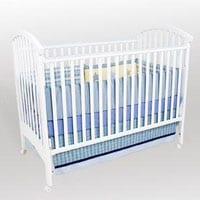Re-announcement of Delta Enterprise Crib Recall
The U.S. (CPSC) and Delta Enterprise Corp., of New York, N.Y. are re-announcing the 2008 recall of more than 985,000 drop-side cribs with “Crib Trigger Lock and Safety Peg” hardware.
Missing safety pegs can create a situation where the crib’s drop-side rail disengages from the track. This can create a hazardous space in which an infant can become entrapped and suffocate.
In January 2011, CPSC and Delta learned of a 2009 death in which a 7-month-old girl from Colorado Springs, Colo. became entrapped and suffocated between the detached drop-side and mattress of her recalled crib. The crib was purchased secondhand and re-assembled without safety pegs in the bottom tracks.
At the time of the October 2008 recall announcement, there were reports of two entrapments and nine detachments in cribs without safety pegs and one death.
“Buying or accepting cribs second hand can be risky,” said CPSC Chairman Inez Tenenbaum. “Second hand cribs may not come with all of the necessary parts that are needed to make sure your baby is safe. We urge parents and caregivers to use caution.”
This re-announcement involves cribs that were made in Taiwan and Indonesia. The cribs were sold at major retail stores including Kmart, Target and Walmart between January 1995 and December 2005 (through September 2007 for model 4624) for about $100.
Delta’s name and address is printed on the mattress support boards and the Delta logo is on the crib’s top teether rail.
CPSC urges parents and caregivers to immediately stop using cribs that are missing a safety peg on either leg of the drop side and contact Delta to receive a repair kit at (800) 816-5304 or visit the firm’s website at www.cribrecallcenter.com.
Parents are reminded not to use any crib with missing, broken or loose parts. Crib age is a factor in safety: At a minimum, CPSC staff recommends that you do not use a crib that is older than 10 years old.
New, mandatory federal crib rules take effect on June 28, 2011. All cribs manufactured and sold after that date must meet new and improved safety requirements. Older cribs do not meet the new standard and can have a variety of safety problems.






Comments are closed.